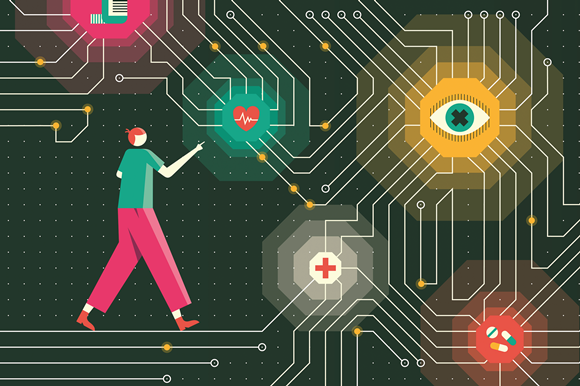Steve Hemsley reports on the latest advancements in health technology, how they will affect the careers of pharmacy professionals, and why new technologies should be embraced in order to win the race for relevance.
copyright by www.pharmaceutical-journal.com
 Technology greatly impacts our day-to-day lives. In healthcare, technology plays an important role in improving patient safety, can save time and money and, if used effectively, address the shortage of skilled staff. Health technology certainly removes some of the more repetitive and mundane tasks in pharmacy, while also helping pharmacy professionals develop their skills in other areas, such as data analysis and provision of actionable insights to improve patient care.
Technology greatly impacts our day-to-day lives. In healthcare, technology plays an important role in improving patient safety, can save time and money and, if used effectively, address the shortage of skilled staff. Health technology certainly removes some of the more repetitive and mundane tasks in pharmacy, while also helping pharmacy professionals develop their skills in other areas, such as data analysis and provision of actionable insights to improve patient care.
Understandably, there is cynicism around whether all health technology consistently offers real value, is worth the investment and can ever replace the skills and emotional support of a human being. There is also concern over the sharing of patient data without compromising confidentiality restrictions.
However, as health technology continues to evolve at such a rapid rate and the NHS adopts increasingly innovative solutions, the pharmacy profession is under pressure to stay well informed of these advancements in order to stay relevant.
Blockchain
A blockchain is a continuously growing list of linked and secured records, called blocks. It is an ideal platform for regulatory compliance because it establishes a verifiable and trusted audit trail. Pharmacies and others who have records included within the chain can be notified of non-compliant events as they happen and the technology determines who sees what information and when.
The IBM Institute for Business Value, is the business ‘think tank’ for the technology company IBM. It surveyed 200 healthcare professionals in 16 countries to assess how they use blockchain — for example, to reduce costs, time and risk around clinical trials, regulatory compliance and medical and health records.
Heather Fraser, a pharmacist and IBM’s Institute for Business Value global lead for life sciences and healthcare, says different areas of pharmacy are moving at different speeds when it comes to adopting new technology, including blockchain. Surprisingly, healthcare is ahead of the financial sector with 16% of the respondents in IBM’s study taking a lead in commercialising blockchains at scale.
Heather Fraser, IBM’s Institute for Business global lead for life sciences and healthcare, says blockchain could provide a way to store a patient’s full medical history
Thank you for reading this post, don't forget to subscribe to our AI NAVIGATOR!
“Blockchain is a way to hold all data together securely, from cradle to grave,” states Fraser. Currently, some health records are held by the GP, some might be at the hospital and some may be at the pharmacy. “What if every one of your vital signs that have ever been recorded, all the medicines taken, information associated with every pharmacy and doctor’s visit, illness, operations and more could be efficiently and accurately captured?” asks Fraser, who appreciates the potential value of having access to a patient’s full medical history. […]
read more – copyright by www.pharmaceutical-journal.com


Steve Hemsley reports on the latest advancements in health technology, how they will affect the careers of pharmacy professionals, and why new technologies should be embraced in order to win the race for relevance.
copyright by www.pharmaceutical-journal.com
Understandably, there is cynicism around whether all health technology consistently offers real value, is worth the investment and can ever replace the skills and emotional support of a human being. There is also concern over the sharing of patient data without compromising confidentiality restrictions.
However, as health technology continues to evolve at such a rapid rate and the NHS adopts increasingly innovative solutions, the pharmacy profession is under pressure to stay well informed of these advancements in order to stay relevant.
Blockchain
A blockchain is a continuously growing list of linked and secured records, called blocks. It is an ideal platform for regulatory compliance because it establishes a verifiable and trusted audit trail. Pharmacies and others who have records included within the chain can be notified of non-compliant events as they happen and the technology determines who sees what information and when.
The IBM Institute for Business Value, is the business ‘think tank’ for the technology company IBM. It surveyed 200 healthcare professionals in 16 countries to assess how they use blockchain — for example, to reduce costs, time and risk around clinical trials, regulatory compliance and medical and health records.
Heather Fraser, a pharmacist and IBM’s Institute for Business Value global lead for life sciences and healthcare, says different areas of pharmacy are moving at different speeds when it comes to adopting new technology, including blockchain. Surprisingly, healthcare is ahead of the financial sector with 16% of the respondents in IBM’s study taking a lead in commercialising blockchains at scale.
Heather Fraser, IBM’s Institute for Business global lead for life sciences and healthcare, says blockchain could provide a way to store a patient’s full medical history
Thank you for reading this post, don't forget to subscribe to our AI NAVIGATOR!
“Blockchain is a way to hold all data together securely, from cradle to grave,” states Fraser. Currently, some health records are held by the GP, some might be at the hospital and some may be at the pharmacy. “What if every one of your vital signs that have ever been recorded, all the medicines taken, information associated with every pharmacy and doctor’s visit, illness, operations and more could be efficiently and accurately captured?” asks Fraser, who appreciates the potential value of having access to a patient’s full medical history. […]
read more – copyright by www.pharmaceutical-journal.com
Share this: